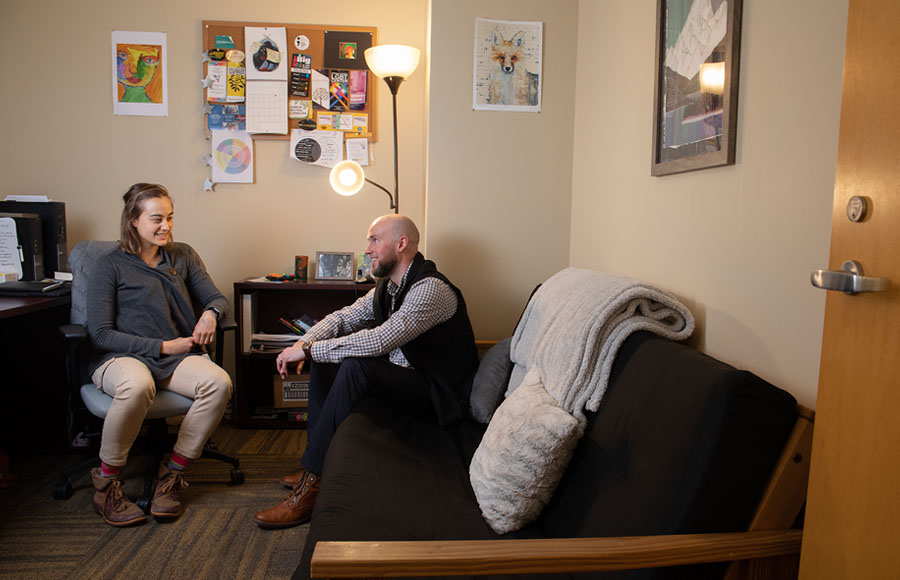
Lexi Gross, left, and Ben Asma, members of Appalachian State University’s Collegiate Recovery Community (CRC) team, meet in the CRC’s space located in the university’s Department of Wellness and Prevention Services. The CRC provides students a space and community that support continued recovery. Photo by Chase Reynolds
BOONE, N.C. — Appalachian State University’s Collegiate Recovery Community (CRC) provides students a space and community that support continued recovery.
It is also a place for their allies, for those looking for a sober space and for anyone focused on developing overall holistic well-being while in college, said Ben Asma, CRC team member and assistant director and substance abuse counselor in Appalachian’s Department of Wellness and Prevention Services (WPS), which oversees the program.
CRC promotes academic excellence by giving each student who wants to be a part of the community a customized success plan, staff and peer support, and proactive, recovery-focused programming.
“One in seven individuals is going to have an issue with substances,” said Lexi Gross, a substance use counselor in WPS and member of the CRC team. She said a university is a “really high-risk environment, so having that support on campus can help those individuals looking to be successful in their academics as well as their recovery.”
The CRC is one of many collegiate recovery programs located at universities in North Carolina and around the country. Asma said the program at Appalachian grew “as a grassroots movement of creating a space and having weekly meetings. It just came from a place where we knew there was need.”
Before the CRC, students’ recovery needs were met through off-campus programs such as Alcoholics Anonymous (AA).
Collegiate recovery programs at some schools focus on a 12-step model similar to AA, but Appalachian’s CRC is grounded in a student-led support model.
“Through group therapeutic interventions and interactions,” Asma said, “we can help students develop coping strategies and skills to maintain their recovery, whatever that recovery may be for them.”
The CRC currently holds weekly social check-ins, which Asma said focus on topics such as stress management, as well as building skills, resiliency and community.
In addition to the recovery aspect, the CRC is also an environment for sober activities. Gross said the activities are a chance for people with the “same language and experience” to engage with people in the community and have fun.
Past activities have included a sober tailgate, trivia night and a Halloween party. The CRC team was skeptical people would even show up for the Halloween party, but they did, Asma said, “and had a blast and a lot of fun.”
To build awareness, the team is working with the Appalachian Popular Programming Society and Student Government Association to create more opportunities for sober events.
What do you think?
Share your feedback on this story.
About Student Affairs at App State
Student Affairs at App State supports student success and well-being by fostering a culture of care, inclusion and engagement. Its mission is to develop lifelong learners and dynamic leaders through meaningful experiences that challenge and support students. Grounded in a commitment to care, engage and transform, Student Affairs creates a student-centered environment that encourages resilience, leadership, service and global learning. Student Affairs encompasses the following units: Campus Activities, Case Management, the Child Development Center, Community-Engaged Leadership, Counseling and Psychological Services, Office of the Dean of Students, New Mountaineer and Family Engagement, Off-Campus Student Services, Plemmons Student Union, Student Conduct, M.S. Shook Student Health Service, Student Legal Services, Student Veteran Services, University Recreation, and Wellness and Prevention Services. Learn more at https://studentaffairs.appstate.edu.
About Appalachian State University
As a premier public institution, Appalachian State University prepares students to lead purposeful lives. App State is one of 17 campuses in the University of North Carolina System, with a national reputation for innovative teaching and opening access to a high-quality, cost-effective education. The university enrolls more than 21,000 students, has a low student-to-faculty ratio and offers more than 150 undergraduate and 80 graduate majors at its Boone and Hickory campuses and through App State Online. Learn more at https://www.appstate.edu.



![How NCInnovation Is Rethinking Economic Development in North Carolina [faculty featured]](/_images/_posts/2026/02/rethinking-economic-development-600x400.jpg)







